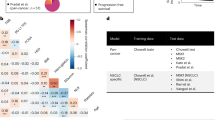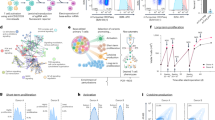Abstract
CONFLICTING results have been obtained concerning the influence of the thyroid gland on the development and the growth of tumours in mammals and man.
This is a preview of subscription content, access via your institution
Access options
Subscribe to this journal
Receive 51 print issues and online access
$199.00 per year
only $3.90 per issue
Buy this article
- Purchase on Springer Link
- Instant access to full article PDF
Prices may be subject to local taxes which are calculated during checkout
Similar content being viewed by others
References
Meites, J., Trainin, A., and Berenblum, I. (unpublished, 1956), cited by Meites (1958).
Meites, J., Cancer Res., 18, 176 (1958).
Gordon, M., “Fishes as Laboratory Animals”, in Farris, J., “The Care and Breeding of Laboratory Animals” (New York-London, 1950).
Author information
Authors and Affiliations
Rights and permissions
About this article
Cite this article
STOLK, A. Effect of Thiouracil and Thyroxine on Development and Growth of Cutaneous Melanoma in Killifish Hybrids. Nature 184, 562–563 (1959). https://doi.org/10.1038/184562a0
Issue Date:
DOI: https://doi.org/10.1038/184562a0
This article is cited by
Comments
By submitting a comment you agree to abide by our Terms and Community Guidelines. If you find something abusive or that does not comply with our terms or guidelines please flag it as inappropriate.



